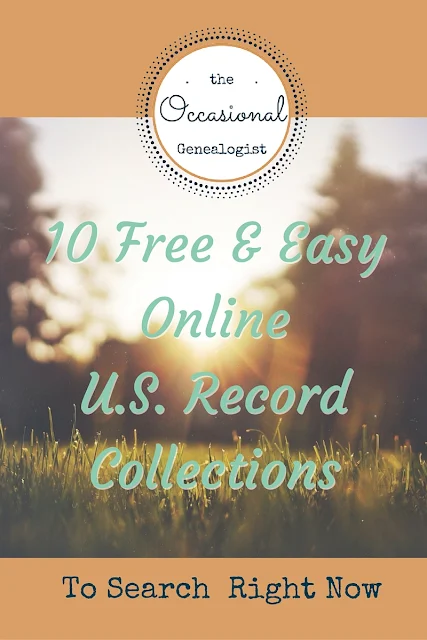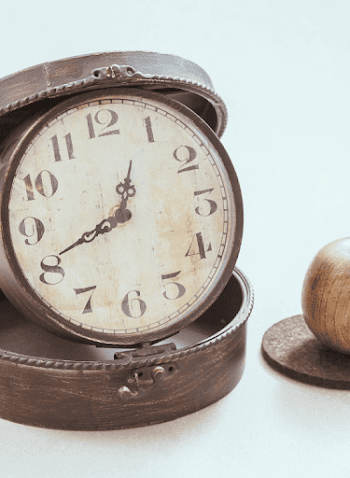
Here are 10 record collections (or record types) you can search online for free and with minimal time needed.
In the sister post are free online genealogy records that take longer to use (like newspaper records). That means all of these links are to databases. Some are just indexes.
With those, you will need to obtain the referenced record (don't just stop with a database entry---would you stop when you found a name in the index of a book? No! You'd finish looking up what it referred to).
Some of the databases include links to the online images. Some of the digital images are free, and some require an additional payment or a subscription to a site.
Don't have time to read this whole post now? Get a PDF copy, with links, when you sign-up for our weekly genealogy newsletter.
1. FamilySearch.org
FamilySearch.org is free to use. It does include some links to online images at "partner" sites which are not free to use from home. If you are in a FamilySearch Center, you will be able to access the online images for free. That being said, nearly all of the images are available for free, so this tops my list of easy and free online collections although it isn't technically one collection.
Federal census records are such a major tool for U.S. genealogists that I wanted to make sure and highlight that they could be searched for free at FamilySearch.org.
This isn't my favorite way to search them as some years have an odd way of displaying making it more difficult to browse the results than search results from a site like Ancestry.com.
Not all the online images are free from home as some are available via Ancestry.com or Fold3 (the previously mentioned "partner" sites). Still, if you don't have subscriptions, you can perform a search at home and go straight to the desired record when you are at a repository that offers access to the subscription sites (including many local libraries in addition to FamilySearch Centers).
This isn't my favorite way to search them as some years have an odd way of displaying making it more difficult to browse the results than search results from a site like Ancestry.com.
Not all the online images are free from home as some are available via Ancestry.com or Fold3 (the previously mentioned "partner" sites). Still, if you don't have subscriptions, you can perform a search at home and go straight to the desired record when you are at a repository that offers access to the subscription sites (including many local libraries in addition to FamilySearch Centers).
3. Social Security Death Index (SSDI)
via Steve Morse "One Step" http://www.stevemorse.org/ssdi/ssdi.html
at GenealogyBank http://www.genealogybank.com/explore/ssdi/all
If you're getting started with U.S. research, the SSDI is a great free tool. It is part of the paid subscription at Ancestry (which is how many people become familiar with it) but is available for free through the above links, and probably more.
Get a PDF copy of this post, with links, when you sign-up for our weekly genealogy newsletter
4. Death Indexes
This isn't technically a "collection." It is a series of web pages for each state which includes links to Vital Record (death) indexes from official sources (states and counties) as well as "death" related links such as obituaries and cemeteries.
It does include some links to paid databases, but most are free sites. The subscription site links are mainly to the death index databases at Ancestry.com, so this is still a great free site to check out when you are researching a person's death. Links to county/town resources are also included under each state.
It does include some links to paid databases, but most are free sites. The subscription site links are mainly to the death index databases at Ancestry.com, so this is still a great free site to check out when you are researching a person's death. Links to county/town resources are also included under each state.
5. Cemetery Records: FindAGrave and BillionGraves
It felt like cheating to make these two links in a list of 10. In addition to searching these directly, they are also included in the search at FamilySearch.org and FindAGrave at Ancestry.com.
If you want a cemetery record specifically, it's easier to search them directly. Use Find A Grave at Ancestry.com if you need some additional search tools such as soundex or wildcards.
If you want a cemetery record specifically, it's easier to search them directly. Use Find A Grave at Ancestry.com if you need some additional search tools such as soundex or wildcards.
6. Daughters of the American Revolution Genealogical Research System (DAR GRS)
This is mainly a search of databases although some digital copies can be purchased online. I used to give an entire lecture on using this system (and that only scratched the surface), so you need to learn more to use this system.
The part that is of interest to the most genealogists and is easy to search is the "Descendants" search which will search all the transcribed (yes, transcribed, not abstracted) membership applications and supplementals. The only exceptions are the very recently approved apps/sups and generations withheld for privacy reasons.
Learn more about the DAR GRS in this post.
The part that is of interest to the most genealogists and is easy to search is the "Descendants" search which will search all the transcribed (yes, transcribed, not abstracted) membership applications and supplementals. The only exceptions are the very recently approved apps/sups and generations withheld for privacy reasons.
Learn more about the DAR GRS in this post.
Get a PDF copy, with links, when you sign-up for our weekly genealogy newsletter.
7. USGS Domestic Name Search
This is more of a tool than a record collection. It can help you identify historical places. Names that haven't been used in an extremely long time may not be included. You can use this database to try and find an equivalent modern name or place a historical location on a map.
8. Civil War Records
Fold3 Civil War Pensions Index https://www.fold3.com/publication/57/us-civil-war-pensions-index-1861-1900
Civil War Soldiers and Sailors Database https://www.nps.gov/civilwar/soldiers-and-sailors-database.htm
Both of these links are to databases/indexes. The Fold3 collection includes digital images of the microfilmed index cards which may include a date of death of the soldier. You can learn a little more about Civil War pension indexes on this page.
Also on Fold3 are Civil War widow's pensions. They aren't free, they aren't "easy," and they aren't complete (after years they are still less than a quarter completed). Still, it's worth knowing some are there if that's what you find in the index.
Also on Fold3 are Civil War widow's pensions. They aren't free, they aren't "easy," and they aren't complete (after years they are still less than a quarter completed). Still, it's worth knowing some are there if that's what you find in the index.
The Soldiers and Sailors database is essentially an index to the compiled military service records for volunteer soldiers and sailors during the Civil War. It does not include any type of digital image.
For both of these collections, you will then need to obtain the record referenced to learn more.
Don't have time to read this whole post now? Get a PDF copy, with links, when you sign-up for our weekly genealogy newsletter.
9. Ellis Island via Steve Morse's search forms
Searching the immigration records for Ellis Island is not that easy via the EllisIsland.org website. It is fairly easy using one of Steve Morse's "one step" forms. There is a description of the different types of forms so you can choose the one for your needs (the link is to the gold form).
If you've never used Ellis Island's site before, go there first and create an account (top right corner).
If you've never used Ellis Island's site before, go there first and create an account (top right corner).
10. SC Department of Archives and History databases
Obviously, if you don't have South Carolina research, this link won't be of interest. However, if you need to research in South Carolina, this is a great collection of databases. Since my specialty is southern research and South Carolina research can be fairly difficult, I wanted to share this link. You can search all the included databases at once or select an individual database to search.
The other "10 Free" list on this blog includes sites that will take some more time to search. You can read that post here.
The other "10 Free" list on this blog includes sites that will take some more time to search. You can read that post here.








